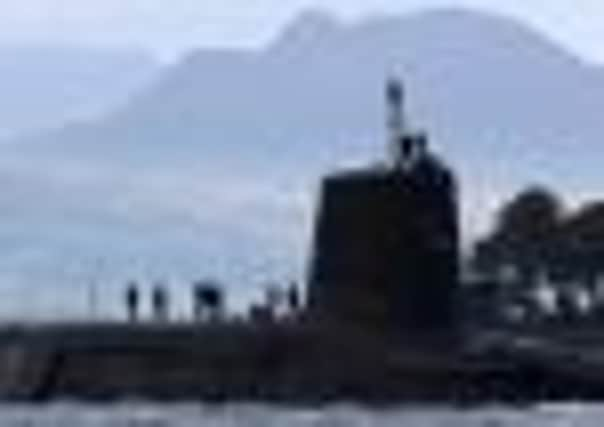Michael Kelly: No place in Nato without the nuclear option


Somewhere among the proposed SNP volte-face on Nato membership, has a principled reason been unearthed? Last week in these pages George Kerevan dug deep to find it.
Most of us who oppose breaking up the UK see Alex Salmond’s attempt to reverse long-standing opposition to this nuclear alliance as an attempt to remove another of the bogey men that might frighten voters into marking a “No” on the ballot paper. A pledge to quit Nato could easily be presented as leaving Scotland defenceless with no big brother to fall back on for protection. The idea of the new state being able to support its own effective army, navy and air force is already a joke worthy of winning an award at the Edinburgh Festival.
Advertisement
Hide AdAdvertisement
Hide AdSo, given that Scotland alone would be unable to defend itself the SNP had to devise a policy that at least seemed credible. The obvious choice would be to strike an alliance with what remained of the UK. However, such a plan, despite being the most feasible, would make an even greater farce of independence after concessions on the Queen, monetary and fiscal policies.
Angus Roberston MP, the SNP’s defence spokesman has turned to our neighbours, the Scandinavians in search of a similar alliance. Discovering that most of these countries were tied to Nato, he was forced to the unpleasant conclusion that Scotland would have to stay in that nuclear alliance simply because there was no other way to turn.
He has been at pains to point out that a majority of Scots, measured through opinion polls, would prefer to stay with this American-supported pact. This statement reveals the pragmatic nature of the decision concerning a matter that many, including probably the majority of SNP activists, believe to be a matter of principle. And a moral principle, it certainly is. The use of nuclear weapons must be immoral.
The value of nuclear weapons is as deterrents. They have worked well as that. But when you really, really do have to use them, it’s time to give up. I argued the same point with George Bush senior when he was the Unites States’s vice president and I was Glasgow’s lord provost. The discussion ended with his words; “Mayor, I guess that’s the difference between you and me.” He may have got my title wrong but his words were chilling. This guy would really have blown us all into oblivion.
So, there is a principle and a logic in the party pressure group SNPCND insisting that leaving Nato is consistent with their party’s vision of a young and peaceful nation.
Kerevan, on these pages, gave an inspiring argument. He sees an independent Scotland as it “awakens to statehood” playing a full part as it enters the world. Scotland would remain in Nato, making its vote count alongside those who want nuclear weapons removed from their soil and in helping kick-start multi-lateral disarmament. “Vote” is slightly over-egging it because, as the Americans have made clear, Nato works on the basis of consensus among its European members. But it is this view of the influence that Scotland could wield in the world that forms one of the unbridgeable divides between nationalists and Unionists. Kerevan can clearly see a principled Scotland being listened to seriously in all international areas, its views weighed on their merits and opinion and policies in major states, alliances and institutions being swayed and changed.
If this scenario hadn’t come from such an intelligent and experienced keyboard as Kerevan’s I would have laughed out loud. My view is that our small struggling state would be ignored by the rest of the world, its head patted patronisingly. It would have less power then than it can now exercise within the UK on defence, other foreign policy and international economics.
Des Browne, former Labour defence secretary and MP for Kilmarnock would have brought his understanding of and feelings for Scotland to any international crisis that might have threatened the Clyde during his tenure. We would have been able to speak to him on first-name terms about our concerns. Would we have more influence if we were lobbying a foreign UK defence department? Or tiptoeing in to see the American appointed as Nato Supreme Allied Commander Europe? And if Germany couldn’t convince its European partners, many of whom it subsidises, to allow it to have tactical nuclear weapons removed from its soil what chance does Scotland have of persuading Russia to agree to multi-lateral disarmament? We’re just being silly now.
Advertisement
Hide AdAdvertisement
Hide AdApplied to the current debate on Nato, the policy doesn’t stack up. The SNP proposal brings nothing to Nato. The question is not should we stay in Nato. An independent Scotland would have to apply to join the club whose mission statement is, according to Hilary Clinton: “As long as there are nuclear weapons, Nato will have nuclear weapons.”
Starting to write the draft application illustrates the glaring anomaly: we want to join your nuclear club, which contains many members who are uneasy about Nato-controlled weapons on their soil but are willing to keep them. We want their protection. But we don’t want to share the risk of having such weapons here. And anyway, in principle we’re against them, whereas you are not. So could you help us remove them to Holland or Belgium – at your expense, of course.
The answer to Scotland’s application lies on the SNPCND website, quoting Nato: “The guarantee of the security of the allies is provided by the strategic nuclear forces of the alliance…A credible alliance nuclear posture and the demonstration of solidarity and common commitment to war prevention continue to require widespread participation by European allies involved in collective defence planning in nuclear roles, in peacetime basing of nuclear forces on their territory and in command, control and consultation arrangements…The alliance will therefore maintain adequate nuclear forces in Europe”.
So, that’s a “No” then?